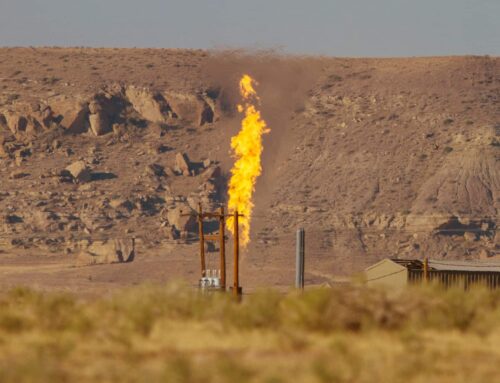Before the clock strikes 12 on the current administration, the federal Bureau of Land Management, the agency that controls more land in the United States than anyone else, has planned seven auctions to lease federal land in nine states for oil and gas development despite an oil glut and industry activity at record lows.
When deciding how to manage roughly 250 million surface acres, the bureau is supposed to uphold a multiple-use mandate to ensure balance among energy development, mining, livestock grazing, outdoor recreation, and all other uses. Unfortunately, under the leadership of Interior Secretary David Bernhardt, the agency has violated this obligation by prioritizing oil and gas CEOs over the public. Instead of working to get taxpayers fair market value for leasing and drilling on our public lands, the agency is assuring taxpayers are shortchanged.
Oil and gas leasing and drilling on our public lands can generate substantial revenue that is shared with states and local communities, which often use it to help fund critical state priorities such as education, healthcare, and infrastructure. But as communities across the country are struggling during the COVID-19 pandemic, reckless lease sales during a global oil glut and an outdated oil and gas leasing system are adding to their financial pain.
Over the past three months, the bureau held oil and gas lease sales covering more than 190,000 acres of public lands across the West — an area around the size of Crater Lake National Park. Predictably, these lease sales are producing low returns for the public, with more than 32,000 acres leased for the minimum legal bid of just $2 per acre. Instead of managing our publicly owned natural resources as strategic assets, Bernhardt is exploiting our leasing system to auction them off for rock-bottom prices.
Taxpayers lose at every step. When oil and gas companies drill on public lands, they are required to pay the owners of the resource, taxpayers, a royalty, or a percentage of the revenue from selling the oil and gas. The federal royalty rate has not been updated in more than a century and no longer reflects the market value of these resources. In the last decade alone, outdated royalty rates have cost taxpayers as much as $12.4 billion in revenue.
As if the low rate wasn’t enough, Bernhardt decided to lower it to almost nothing for hundreds of leases this summer. In most cases, instead of paying $12.50 of every $100 of oil and gas sold, operators could pay just $0.50. While the public only knew about half of these instances, my organization estimated they would cost taxpayers at least $8 million in revenue. The total cost is surely higher. A new report from the Government Accountability Office finds the administration provided this royalty relief haphazardly, without stopping to see if it would be effective and with no way to know if we got any benefit from it. By allowing oil and gas CEOs to pay even less to drill on America’s public lands, Bernhardt and the bureau cut funding to states by millions of dollars during the pandemic. That funding could have gone toward funding hospitals, schools, and other state priorities.
But the gross mishandling of our public lands does not end there. As global energy prices hit record lows, oil and gas companies across the country are filing for bankruptcy, leaving behind “orphaned” wells and decaying infrastructure, and sticking taxpayers with the cleanup costs. The problem is the result of a decades-old system that no longer reflects the reality of energy development. Prior to drilling on public land, companies are required to secure a bond: money meant to cover the cost of cleaning up well sites. But because federal bonding rates have not been updated in over half a century, they often fall short of covering the true cost of cleanup, which may exceed $6 billion in total. As state budgets get even tighter due to COVID-19 and the associated economic decline, the bureau can no longer let oil and gas companies off the hook for their mess on our public lands.
People have entrusted the federal government with our public lands and natural resources, with the expectation they will handle them with the taxpayer’s best interest in mind. It is the responsibility of lawmakers and the Bureau of Land Management to ensure that this trust is not broken. Congress must support legislation like the bipartisan Fair Returns for Public Lands Act introduced by Sens. Tom Udall, a Democrat from New Mexico, and Chuck Grassley, an Iowa Republican, that will overhaul our outdated oil and gas leasing system, and Bernhardt must halt all oil and gas leasing until the market stabilizes.










